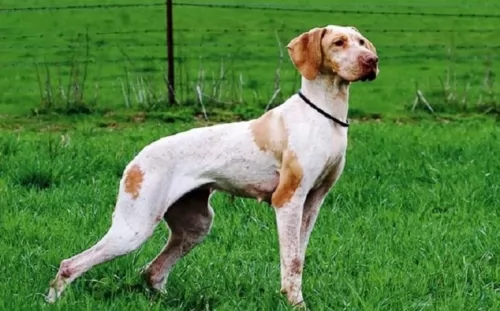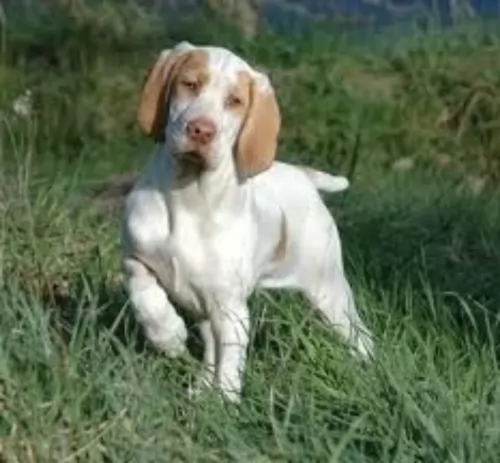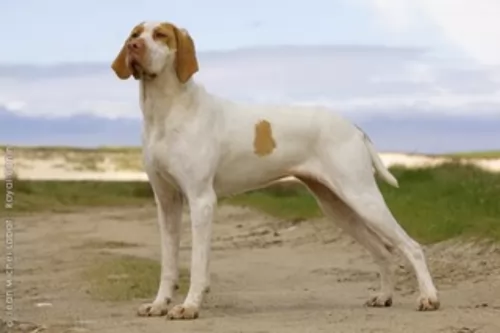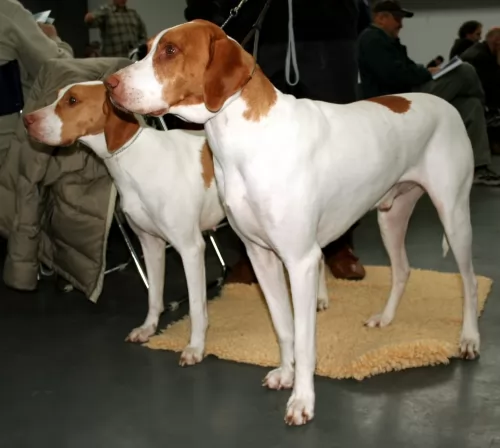 Petzlover
Petzlover Chinese Shar Pei is originated from China but Ariege Pointer is originated from France. Chinese Shar Pei may grow 11 cm / 4 inches shorter than Ariege Pointer. Both Chinese Shar Pei and Ariege Pointer are having almost same weight. Chinese Shar Pei may live 4 years less than Ariege Pointer. Both Chinese Shar Pei and Ariege Pointer has almost same litter size. Chinese Shar Pei requires Moderate Maintenance. But Ariege Pointer requires Low Maintenance
Chinese Shar Pei is originated from China but Ariege Pointer is originated from France. Chinese Shar Pei may grow 11 cm / 4 inches shorter than Ariege Pointer. Both Chinese Shar Pei and Ariege Pointer are having almost same weight. Chinese Shar Pei may live 4 years less than Ariege Pointer. Both Chinese Shar Pei and Ariege Pointer has almost same litter size. Chinese Shar Pei requires Moderate Maintenance. But Ariege Pointer requires Low Maintenance
 The Chinese Shar-Pei is originally from Canton, China. The Shar-Pei has a blue-black tongue and many deep wrinkles. They have more wrinkles as a puppy than the adult dogs do. They are one of the rarest breeds in the world and are considered a basal breed – meaning their existence predates modern canines. Most canines are related to the gray wolf through genetic admixture. However, there are breeds like the Siberian Husky, the Greenland Dog, Finnish Spitz and the Shar Pei are all related to the Taymyr Wolk of North Asia through admixture. The Shar Pei is found throughout the centuries in Chinese artwork, especially found during the Han Dynasty, and are considered one of the most ancient of breeds on earth today. In this period, they were fighting dogs then became beloved pets. Today the Tibetans still use them as fighting dogs.
The Chinese Shar-Pei is originally from Canton, China. The Shar-Pei has a blue-black tongue and many deep wrinkles. They have more wrinkles as a puppy than the adult dogs do. They are one of the rarest breeds in the world and are considered a basal breed – meaning their existence predates modern canines. Most canines are related to the gray wolf through genetic admixture. However, there are breeds like the Siberian Husky, the Greenland Dog, Finnish Spitz and the Shar Pei are all related to the Taymyr Wolk of North Asia through admixture. The Shar Pei is found throughout the centuries in Chinese artwork, especially found during the Han Dynasty, and are considered one of the most ancient of breeds on earth today. In this period, they were fighting dogs then became beloved pets. Today the Tibetans still use them as fighting dogs.
Following the Communist Revolution, the Char Pei was almost extinct until Margo Law saved the breed. During this time, they smuggled around 200 dogs into the United States. All the dogs in the United States today come from those 200 dogs. They were accepted in 1992 into the AKC. The dogs served as trackers, hunters, ratters, guard dogs and herders.
 The Ariege Pointer is a French hunting dog, coming from the Ariegeois region of France.
The Ariege Pointer is a French hunting dog, coming from the Ariegeois region of France.
Known as the Ariege Pointing Dog, French Pointer or Braque de l’Ariege, these dogs came from the old French Braque dogs that were crossed with the orange and white Southern Braques.
It was in 1990 that a team of breeders decided to devote themselves to the breed’s survival. The Braque de l’Ariege was recognized by the United Kennel Club in 2006.
 The Chines Sar Pei has what if known as a Horse-coat which is prickly, harsh, and rough to the touch on one direction and rough to touch on the other. Western Shar Peis can be Horse, Bearcoat and Brush. The Brush is longer and smoother while the Bear coat is rare and in-between the two. The Bearcoat is not accepted by the AKC while the other two types of coats are.
The Chines Sar Pei has what if known as a Horse-coat which is prickly, harsh, and rough to the touch on one direction and rough to touch on the other. Western Shar Peis can be Horse, Bearcoat and Brush. The Brush is longer and smoother while the Bear coat is rare and in-between the two. The Bearcoat is not accepted by the AKC while the other two types of coats are.
The Shar Pei should have a hippo shaped head, a black-purple tongue, black mouth, deep set almond shaped dark eyes, small ears and red coats. His profile is square, and his muzzle is full and wide. Most Shar Peis only have facial and neck wrinkles left as adults.
 The Ariege Pointer has always been a dog kept essentially for hunting and not as a companion dog. He stands between 55 – 67cm and weighs 25 – 30kg.
The Ariege Pointer has always been a dog kept essentially for hunting and not as a companion dog. He stands between 55 – 67cm and weighs 25 – 30kg.
He is an attractive looking dog with quite a large head while the body is sleek and slender to look at. The ears are quite large and are floppy while the tail is traditionally docked to give him that distinctive look. These days the tail is often left long and hangs downwards.
The coat is short, single and rough and is white with tan or orange patches. The coat can also be speckled or ticked.
The Ariege Pointer is a hunting dog who is friendly towards strangers and therefore won’t make a particularly good watchdog.
These dog are lively, independent and good natured and they make excellent companion dogs. They are fairly docile and and get on well with children and pets in the home. Just like with any other dog, they need to be trained and socialized early.
 The Shar Pei must be socialized early to other people, children and animals if he is to be friendly with them. He is loyal to his people and instinctively wary of strangers. He will be completed devoted to his people, but he is reserved and independent. They can be aggressive and territorial if not socialized. They are stubborn, loving and loyal. They are dominant, brave and playful. They are great watch dogs. Keep them busy because they tend to think a lot independently and if they don’t have a job they may create one.
The Shar Pei must be socialized early to other people, children and animals if he is to be friendly with them. He is loyal to his people and instinctively wary of strangers. He will be completed devoted to his people, but he is reserved and independent. They can be aggressive and territorial if not socialized. They are stubborn, loving and loyal. They are dominant, brave and playful. They are great watch dogs. Keep them busy because they tend to think a lot independently and if they don’t have a job they may create one.
 The Ariege Pointer has always been an excellent pointing- and hunting dog. When it comes to being a family pet, he puts his hunting skills aside and becomes a loyal, loving, friendly pet.
The Ariege Pointer has always been an excellent pointing- and hunting dog. When it comes to being a family pet, he puts his hunting skills aside and becomes a loyal, loving, friendly pet.
They are considered to be rare dogs, and were at one time bordering on extinction. Those who have owned one of these hunting dogs will be glad to know that they are no longer considered endangered. They’re not your friendly, social kind of dog that you find in other dog breeds, but with training and socialization he will make a fine companion and family friend.
 Because of the rushed and inexperienced breeding programs in the United States due to the popularity of the breed, there are many health issues in the North American version of the Shar Pei. Their life expectancy is generally under ten years. They are prone to:
Because of the rushed and inexperienced breeding programs in the United States due to the popularity of the breed, there are many health issues in the North American version of the Shar Pei. Their life expectancy is generally under ten years. They are prone to:
 The Ariege Pointer is a working dog breed, used for hunting and retrieving prey. With good care the dog can live to be a good 12 – 15 years of age.
The Ariege Pointer is a working dog breed, used for hunting and retrieving prey. With good care the dog can live to be a good 12 – 15 years of age.
However, with every dog breed there are common dog diseases to watch for. This dog has long floppy ears and these can get damp and will need to be cleaned and dried regularly otherwise the long ears can be prone to infection.
Apart from being prone to health issues such as an ear infection, you want to be aware of very common dog ailments such as hip dysplasia which can cause lameness in your dog.
Whatever illness your dog has, and you see he isn’t acting his usual self, get him to the vet for a check-up and then make sure that all treatment and medication prescribed is adhered to.
 Feed a good quality dry dog food but do not overfeed. You should feed twice a day about one cup per six pounds for puppies. Adults should have two cups a day.
Feed a good quality dry dog food but do not overfeed. You should feed twice a day about one cup per six pounds for puppies. Adults should have two cups a day.
• Familial Shar Pei Fever – congenital and serious. This produces fevers that can last from 24 hours to three days. Swelling around the ankles is due to fluid retention.
• Entropion eye issues – eyelashes curl in and inflame the eye. Can cause blindness if not treated. Requires surgery.
Both as a puppy and an adult this is a pretty active dog. He needs at the very least to be walked every day or have a back yard to play in. They are sensitive to heat so bring them in when its really hot and don’t walk them in the heat. They love to play, are athletic and competitive. Try agility, tracking, rally and obedience trials.
 Your attractive Ariege Pointer will give birth to 2 – 8 puppies. If you don’t want puppies, then spaying or neutering is excellent and can actually have many health benefits for your pet.
Your attractive Ariege Pointer will give birth to 2 – 8 puppies. If you don’t want puppies, then spaying or neutering is excellent and can actually have many health benefits for your pet.
This dog with its short coat requires very little maintenance, and a good brush twice a week will ensure the coat remains glossy and shiny, giving you the chance to also check for fleas and ticks.
Don’t just assume every dog has bad breath. Bad breath can be indicative of dental disease, and dental problems can cause all kinds of other illnesses within the body. Make sure that while your pet’s teeth are healthy, that you brush them 2 or 3 times a week with special canine toothbrush and toothpaste.
The Ariege Pointer requires regular exercise as it is a lively, energetic dog. He can adapt to life in the city or the country, but ideally he needs a place with a large garden.
Wherever you keep him as a pet, make sure you take him for walks every day and that you play ball- or rope games with him. Ignoring his exercise needs will turn him into a bored, frustrated pet, and that isn’t fair towards him.
Make sure you choose good quality commercially manufactured foods for him. Adding in some home-made food to his kibble such as cooked brown rice, vegetables and chicken will be wonderfully good for him.
Every dog will require some raw meat added into his diet from time to time. Many skin diseases can be treated by adding in raw meat. After all, before dogs were domesticated they lived on raw meat, and including this ingredient back into their diet guarantees to make a remarkable difference in terms of good health.